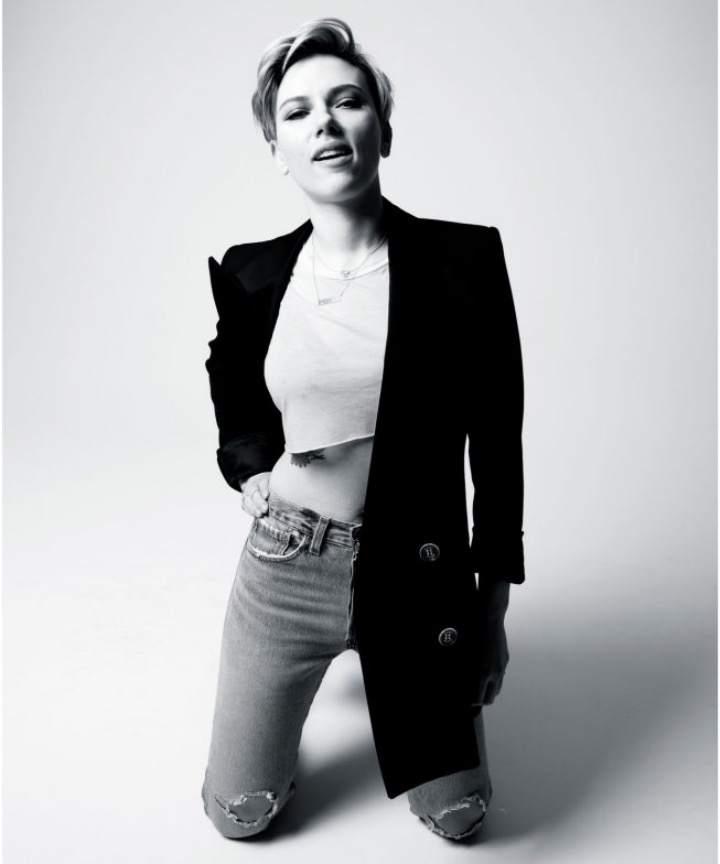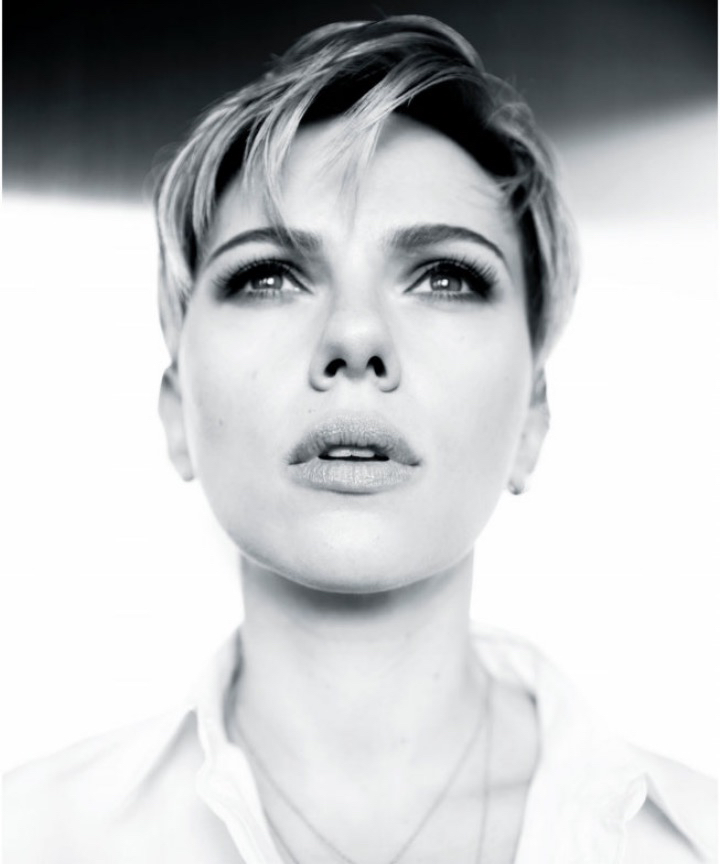斯嘉丽·约翰逊
INTERVIEW:SCARLETT JOHANSSON
A candid conversation with the star (who’s uninterested in her status as 2016’s highest- grossing actor) about motherhood, monogamy and why she keeps playing lethal superwomen
斯嘉丽·约翰逊访谈
——与这位巨星(她对自己2016年成为最高票房收入的演员不感兴趣)就母亲角色、婚姻制度和为什么她一直扮演致命超级女性角色等话题进行的坦诚对话
INTERVIEWER:You were born and raised in New York City. What was it like to grow up here?
问:你在纽约市出生、长大。你在这里成长的情况是怎么样的?
JOHANSSON: New York was different then. That makes me sound like an old geezer, but the city was much more accessible. My group of friends was really diverse. We all came from different socioeconomic backgrounds, and our parents did different things. Some parents were drug dealers, some were working in finance, and we all lived in the same community. While it’s still probably the greatest city in the world—I’m biased—I think it used to feel like more was possible here for more people. There’s a great leather store down in the West Village that has been there forever. I was there a couple of months ago, and the guy who has been making sandals since 1967 or whatever is fighting his landlord to stay in that space, because it was once rent stabilized and that doesn’t exist anymore. In the next couple of years it will probably turn into some corporate business. It’s sad, because that’s the heartbeat of New York. That’s what drove the city, what made things seem possible.
约翰逊:那时候的纽约不太一样。你都问得我好象成了一个老古董似的,但是这座城市比现在要容易让人接受。我的朋友圈里三教九流,什么人都有。我们有不同的社会经济背景,我们的父母都从事不同的工作。有的父母是药贩子,有的在金融行业,我们都住在一个社区。虽然它仍然可能是世界上最大的城市——我的偏见——我认为这里过去还可以有更多的人。在西村一直有一个很大的皮革商店,而且永远都会在那儿。几个月前我去那里,有一个从1967年或哪年以来一直丑闻缠身的家伙在和他的房东斗,想在那个地方住下来,因为这个地方是他租好了的,而且以后不会再有了。过几年,这里可能会改来办公司。这未免令人伤心,这可是纽约的心脏,是给这个城市带来动力、使一切变得可能的地方。
INTERVIEWER:Almost everyone I know who grew up in New York City has this lovely quality— not just being exposed to all the different artists working around you but, inevitably, to all these different ways of being, ways of living, ways of seeing the world.
问:我所知道的所有在纽约长大的人都有这样一个令人着迷的特点——他们不但会曝露在身边工作的所有不同的艺术家当中,也会不可避免地曝露在拥有不同生存方式、生活方式、观察方式的人群中。
JOHANSSON: And you can be yourself here, or whatever version of yourself you want to be. That’s not possible in a lot of other places. I love the idea of raising my daughter here. She’s probably exposed to so many more things just going to the playground than almost any other toddler her age growing up in a lot of other places.
约翰逊:在这里你可以成为你自己,或按照任何你自己的方式生活。这在很多其他的地方是不可能的。我非常想在这里带我的女儿生活。她仅仅是去游乐场就可能会曝露在跟她年龄相仿、在很多其他地方长大的小孩要多得多的事物当中。
INTERVIEWER:You had your daughter in 2015?
问:你是2015年生的你女儿?
JOHANSSON: What year are we in? No, 2014—I can’t even remember. [laughs] She’s two and a half now.
约翰逊:哪年?不,是2014年——我差不多都记不得了。(笑)她现在两岁半了。
INTERVIEWER:Do you think motherhood has changed you?
问:你认为当母亲改变了你吧?
JOHANSSON: Oh, it has changed me, yes. Just the process of being pregnant and giving birth was incredibly profound. Also surrendering to the fact that with babies, and particularly infants and toddlers, you have to let go of your expectations and of whatever instincts you have to take control of the situation. Of course, being a mother, you have to make decisions all the time that affect this person who is completely dependent on you, but you also have to surrender to the experience, and that in itself is really liberating. For me, it’s the best thing that has ever happened. Ever. Somebody once described it to me as your heart growing this other chamber, and I think that’s really profoundly true. Your capacity to love something, at least in my experience, deepens to a whole other space. I think I was afraid that life would change, and it does; it dramatically changes. But I feel in a lot of ways more myself now than I did before.
约翰逊:嗯,是改变了我,没错。仅仅是怀孕和生产的过程就足够深奥了。还有,有了孩子尤其是婴幼儿之后,你不得不放弃你的打算以及你的一切天分,来控制局势。当然,当一个母亲,任何时候你都必须对那个完全依赖你的人做出有影响力的决定,你不得不向此投降,而做这件事真的非常解脱。对我来说,这是迄今我经历的最美妙的事情。没有比这更美的事情。曾经有人对我形容说,就好象是心脏长到了另外这一个心室似的。我非常赞同这个观点。你爱的能力,至少在我看来,会深化其他一切的领域。我认为自己害怕生活会改变,但生活会改变,而且会发生戏剧性的变化,但是现在我感觉自己比以前要自我得多。
INTERVIEWER:That’s a beautiful way of talking about it.
问:说得太好了。
JOHANSSON: I understand the importance of my own happiness now more than I did before. Because you see how it affects somebody else, and you’re kind of like, If I’m not happy, then I can’t be in tip-top shape for this other person.
约翰逊:我比以前更加明白自己幸福的重要性。因为你会发现,这会影响到其他人。并且,你会发现,如果你不幸福,你就不能够成为这个人的顶流。
INTERVIEWER:This question is asked incessantly of women and very rarely asked of working fathers, but do you feel parenthood has changed the way you approach your work?
问:这个问题经常被用来问女性,但很少用来问到在工作的父亲们——你感觉为人父母有没有改变你的工作方式?
JOHANSSON: Where I want to be working is definitely something. That’s just a practical part of it, though I’m fortunately at a place in my career, after 20-whatever years, where I can dictate that a little bit. It will probably get more challenging as she gets older, once she’s in school and her life is more established in one place. It’s a struggle for a lot of people, because we exist in this weird nomadic industry where almost everybody on a crew has a family, and it’s hard. It’s hard on relationships; it’s hard on your partner, your kids, family in general, friends.
约翰逊:我想要工作的地方非常显要,这正是考验人的地方,尽管我很幸运,在这里从业20年或多少年,多少可以有一点自由。等她年长一些后,事情会更具挑战性,一旦她上学,生活多少会固定在一个地方。这对很多人来说是一个挣扎,因为我们生存在这样一个光怪陆离、流动的工业社会,几乎团队中的每个人都有各自的家庭,这很难。处理关系很难,处理与你的搭档、你的孩子、你的家庭乃至你的朋友的关系,都很难。
INTERVIEWER:Has that been a challenge for you?
问:这对你来说算不算是一个挑战?
JOHANSSON: When I was doing Ghost in the Shell, I was in New Zealand with our daughter for six months. It was so hard: The distance and the weight of the job itself were really hard on me. It was a big movie with a lot happening. I spent all day fighting people— and literally fighting with myself. I was battling with the character. I remember saying to Rupert Sanders several times, “Can one good thing happen to this character? One great moment?” The answer was no. Spoiler alert: It’s a fuckin’ dark ride for this person, or cyborg or whatever.
约翰逊:我在演《攻壳机动队》的时候,我和我的女儿在新西兰生活了六个月。距离很遥远,工作任务又很重,对我来说这就很难。这部电影是一个大制作,戏份很多,我整天要和人打斗——并真正跟自己打斗,我在跟这个角色战斗。我记得对鲁伯特·桑德斯说了几次:“会有好事、好时候落在这个角色上吗?”答案是否定的。斯波勒尔说:“这个人、机器人什么的前途暗淡。”

INTERVIEWER:What do you think you’d be doing if you weren’t acting?
问:你认为你息影之后会干什么?
JOHANSSON: Oh gosh, I don’t know. I probably would have gone into some kind of medical profession. I’d be rooting around in somebody else! I’m interested in people.
约翰逊:噢,天哪,我不知道,可能我会去当医生。我跟别人息息相关,我对人感兴趣。
INTERVIEWER:They’re such different disciplines, but they both rely on a kind of intuition.
问:他们行规大不一样,但都依赖一种直觉。
JOHANSSON: I could have been a dermatologist. I would have actually loved being a dermatologist. That’s a dream job. All my friends are like, “What is this weird thing on me?” And I’m like, “Let me see it!” But I don’t think I could do seven years of schooling.
约翰逊:我可能会去当一名皮肤科医生。我喜欢当皮肤科医生,这是一个理想的工作。我所有的朋友都说,“这么好的事会到我头上来?”我会说,“我来试试看!”但我并不认为自己能够学七年。
INTERVIEWER:I’m also not sure that Hollywood would let you go so easily.
问:我也不认为好莱坞会轻易让你走。
JOHANSSON: Oh, I don’t know. There’s always someone else to fill the void.
约翰逊:哦,我不知道,总会有人来补缺的。

INTERVIEWER:I read recently that you were the highest-grossing actor of 2016.
问:我最近读到,你是2016年票房最高的演员。
JOHANSSON: I make a lot of movies that have a huge built-in audience, and that drives a lot of it. But it’s been a very productive few years.
约翰逊:我演过很多电影,有大量固定的观众群,带来很多票房收入。但是,这是为数不多的非常有成就的一年。
INTERVIEWER:Surveying your body of work, there’s an interesting mix of independent, idiosyncratic films and then these intensely commercial franchise movies. Do you try to keep those things in balance?
问:盘点你的全部剧目,这是一个有趣、独立、有特质的电影混合体,还有这些有着巨大商业经营的电影。你想在它们之间做一些平衡吗?
约翰逊:我一直希望做一些平衡,而且我最后成功做到了这一点。我喜欢乔恩·费儒执导的《钢铁侠》,以及他与我钟爱已久的罗伯特·唐尼的合作。我并不算是一个真正的喜剧书迷。我喜欢蒂姆·波顿的《蝙蝠侠》系列,但这不是我的类型。但是费儒好象找到了你谈到的平衡——一个具有雄才大略、独立、有创造力的人。这是史无前例的。这是以一个新的方式讲述那个故事。这还明显是真实的,因为之后象华纳兄弟这样的DC和制作室也开始这样做。看看《自杀小队》的阵容——我们看到威尔史密斯在这些大片中的表演,但是选杰瑞德·莱托来演小丑?这是一个非常受欢迎的趋势,我想。
INTERVIEWER:Tell me a little about your process as you prepare for a new role.
问:请讲一讲你在准备一个新角色时的过程?
JOHANSSON: I start by trying to find some physicality to the character that I can hold and return to. Whether that’s a self-consciousness, like a person who is worried about aging, or maybe it’s somebody who, like the Major, has no sense of her own. She knows her physical body, but she has no care or awareness of her self.
约翰逊:一开始,我会尝试去找一些这个角色的生理特征,以便自己能够把握、还原。或者这个角色是象担心衰老之人的自我意识,或者这个角色是象没有自我意识的梅杰。她明白自己的身体,但是对自己并不在意或者没有什么感觉。
INTERVIEWER:That’s also true of the women you play in Under the Skin and Her. Each of those characters is essentially just a disembodied consciousness.
问:你在《皮囊之下》和《她》中扮演的女性角色也是这样,每个角色都灵魂空虚。
JOHANSSON: With Her I actually had a hyperawareness of myself because I was stuck in a black box. It’s just my voice, and so you become hyperaware of certain habits.Doing the sex scene with Joaquin was an exercise in letting go.
约翰逊:我在《她》的戏里,实际上对自己非常有感觉,因为我困在了一个黑盒子里。我只声音,这样你们对某些习惯感受强烈,和杰昆演床戏是练习消除自己执着。
追光译,2023年1月18日
扫码参与评论与作者和更多用户交互